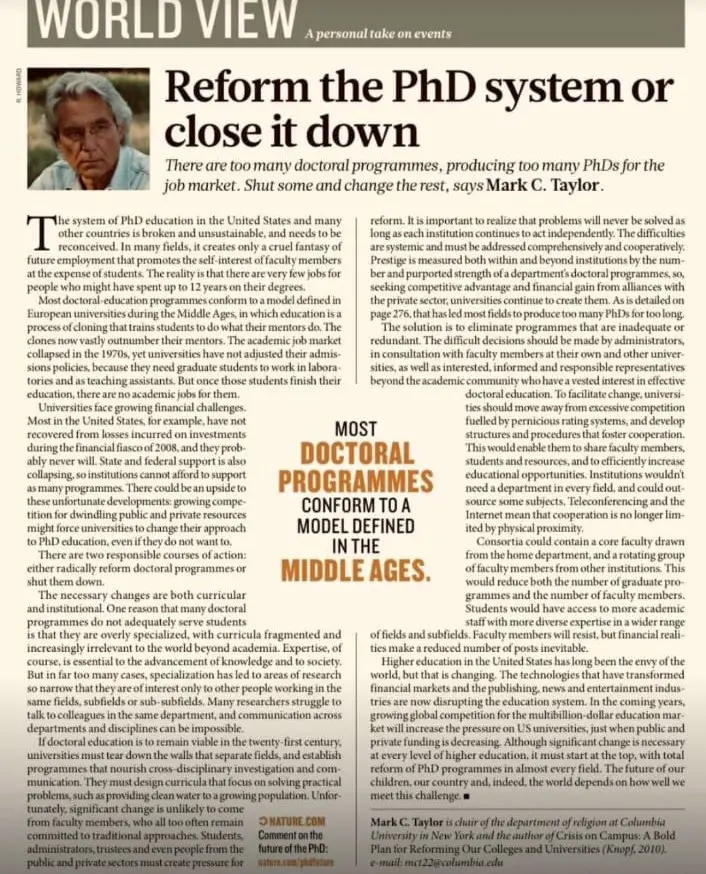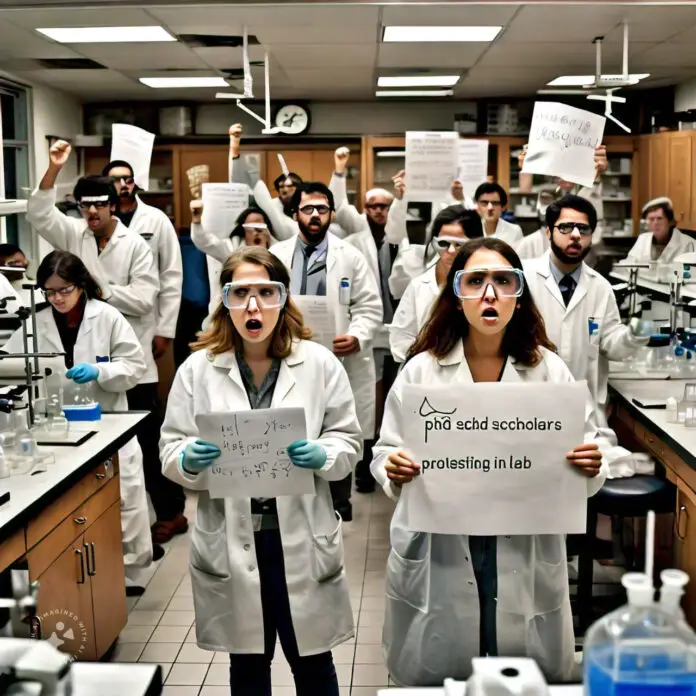The PhD system, especially in the United States, has reached a breaking point. Mark C. Taylor, in his article on Nature titled “Reform the PhD System or Close It Down,” highlights why the current model is outdated and unsustainable. The PhD structure, still based on medieval practices, churns out too many graduates for an already limited academic job market. This has left many PhD holders disillusioned and underemployed.
Let’s explore why the system needs to change—and fast!
Outdated Model: Stuck in the Middle Ages
Most doctoral programs conform to a structure that dates back to medieval European universities. The goal back then? To replicate mentors by producing clones. This rigid model still exists today, even though the academic job market has drastically changed.
- Problem: Universities graduate too many PhDs with no corresponding jobs in academia. Graduates end up in non-academic roles that don’t fully utilize their skills.
- Example: A PhD in history might struggle to find a professorship, only to end up in a job unrelated to their specialization.
Reform the PhD System or Close It Down: A Call for Change

Too Much Specialization, Too Little Flexibility
One of the key flaws in the PhD system is its over-specialization. PhD candidates focus on particular topics that are often irrelevant to industries outside academia. This leaves graduates with narrow expertise and limited job options.
- Solution: Shift towards interdisciplinary programs that allow PhDs to gain diverse skills applicable across various industries.
The Harsh Reality of the Job Market
According to Taylor, most PhD programs fail to prepare students for the tough realities of the job market. Academic jobs have dwindled, but universities continue producing PhDs, leading to a supply-demand imbalance.
- Fact: In some fields, only a small percentage of PhD graduates secure tenure-track positions, forcing many to seek non-academic roles.
- Suggestion: Universities should limit the number of PhD admissions to align with job market realities.
The Two Paths Forward: Reform or Shutdown
Taylor suggests two clear solutions: radically reforming or shutting the PhD system. If left unreformed, universities will continue producing over-specialized graduates who struggle to find employment.
- Reform option: Introduce interdisciplinary studies, encourage collaboration between departments, and update curricula to reflect modern industry needs.
- Shutdown option: If universities cannot reform, they should consider shutting down PhD programs in oversaturated fields to reduce the burden on students and the job market.
What Can Be Done to Fix the System?
Here are a few steps universities can take to reform their PhD programs:
- Industry Collaboration: Partner with industries to give PhDs real-world experience during their studies. For instance, a tech company could collaborate with universities to offer projects related to AI or data science.
- Shared Faculty Across Institutions: Universities could pool resources by sharing faculty members, which would reduce costs and diversify the teaching pool.
- Curriculum Flexibility: Expand PhD programs to allow students to take courses across different departments, enhancing their employability in various sectors.
The Impact of Technology on Higher Education
The rise of online learning platforms like Coursera and edX is shaking up higher education. These platforms offer advanced courses that rival PhD programs but without the massive time and financial investment.
- Trend: More students are opting for short-term, specialized courses that quickly equip them with in-demand skills—no need for a long, expensive PhD journey.
- Action: Universities need to adapt to this new educational landscape by incorporating technology into their programs.
The Debate about Reforming or Shutting Down the PhD System

The debate about reforming or shutting down the PhD system has been ongoing for several years. Here are some arguments for and against reforming or closing down the PhD system:
Arguments For Reforming the PhD System:
- Length and Cost: PhD programs are lengthy and expensive, often taking 4-6 years or more to complete, with significant financial burdens on students.
- Limited Job Opportunities: The academic job market is highly competitive, with few tenure-track positions available.
- Mental Health Concerns: PhD students often experience high levels of stress, anxiety, and depression.
- Lack of Diversity: PhD programs struggle to attract diverse candidates, particularly from underrepresented groups.
- Overproduction of PhDs: The number of PhD graduates exceeds the availability of academic positions.
Arguments Against Closing Down the PhD System:
- Knowledge Advancement: PhD programs drive innovation and advancement in various fields.
- Expertise Development: PhDs train specialists who become leading experts in their fields.
- Societal Impact: PhD research addresses critical societal challenges.
- Economic Growth: PhD graduates contribute to economic development through entrepreneurship, innovation, and knowledge transfer.
Potential Reforms:
- Streamline Programs: Shorten program lengths and reduce costs.
- Diversify Career Paths: Encourage non-academic career options.
- Improve Funding: Increase funding for PhD students.
- Enhance Support: Provide mental health resources and diversity initiatives.
- Industry Partnerships: Foster collaborations between academia and industry.
The PhD system requires significant reforms to address its challenges, but shutting it down would jeopardize the advancement of knowledge and expertise.
Conclusion: The Future of the PhD System
The PhD system is at a crucial juncture. Either it reforms to meet the demands of the modern world, or it risks becoming irrelevant. By embracing interdisciplinary learning, industry partnerships, and technological advancements, PhD programs can regain their value. If universities refuse to adapt, they will continue to churn out graduates ill-equipped for today’s job market.
The message is clear: Reform the PhD system or shut it down. It’s time for universities to choose.
Source: Reform the PhD System or Close It Down by Mark C. Taylor, Nature

